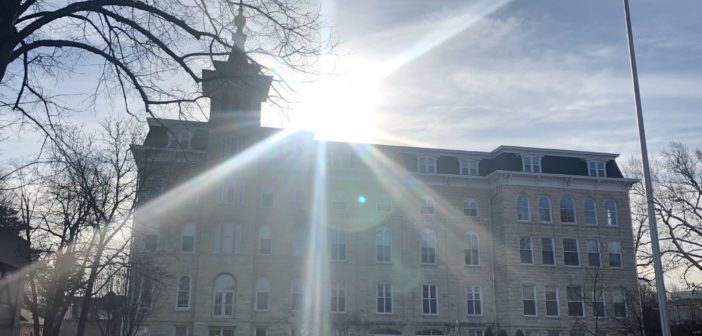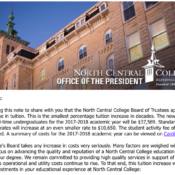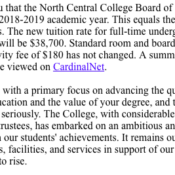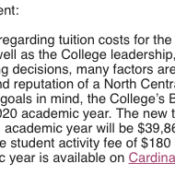The annual “smallest percentage tuition increase in decades” emails may be over, but tuition for the 2019-20 school year has increased another 3%.
The March 21 email from Vice President for Finance Maryellen Skerik did not use the exact language used by President Troy Hammond in previous years. According to the email, the 2019-20 full-time undergraduate tuition rate will increase to $39,860 compared to the 2018-19 rate of $38,700.
Seniors who have spent the last four years at the College have seen a 9% increase in their tuition. For the 2015-16 school year, full-time undergrad tuition was $35,241 and has increased by $3,459 for the 2018-19 school year. This may seem insignificant in the bigger picture, but quickly adds up when the growing costs don’t produce obvious results.
Bonnie Coleman, ’19, said that the food on campus has improved since her first year and the switch to free laundry have been positives, but she does not feel this is worth the continuous increase in tuition. She pointed out that having ‘free’ laundry still comes with a price tag.
Audio PlayerRachel Kolling, ’20, said she is stressed because her loans will increase and create a bigger financial burden for her parents. She views the news as a negative reminder that sudden financial increases come quick and apply to all, and she believes those in the depths of their degree should be grandfathered in and the increase should only apply to newcomers; freshman or transfers.
Audio Player“These small increases still add a lot to what I’m going to pay in the future,” said Kolling.
One of the main concerns among students is that they are aware of the increasing tuition but either cannot see where the money goes or are not being told what it goes toward.
“I have no idea where it goes,” said Coleman. “Which is alarming because I pay so much money to go here and I don’t know what it’s going to.”
Coleman is not the only student who feels this way, but former Chronicle editor Caleb Lundquist explained in a May 2018 article that there is no “grand conspiracy unfolding” with the increasing tuition. Though students may not see where the money is going, it is broken down to cover costs across campus.
North Central is not the only college in the area raising the price of tuition. For the 2018-19 school year, Wheaton College’s tuition increased three and a half percent from $35,190 to $36,420. Benedictine University, however, decided to not increase tuition for the upcoming school year, with their statement reading:
“At a time when many colleges and universities throughout the country are raising costs, the University announced today its traditional undergraduate tuition and fees will be frozen…”
The increasing tuition may lead to a change in enrollment or the transfer rates for colleges like NCC. According to a Forbes article by Richard Vedder, enrollment is down in American colleges. The Midwest, with Illinois in particular, is one of the top states seeing a major decrease.
“Facing high fixed costs and relatively stagnant or sometimes falling state support, enrollment declines mean the loss of vital tuition revenues, forcing schools to adopt previous politically unacceptable forms of change in order to survive,” said Vedder.
Despite this, many colleges continue to raise the cost of tuition annually. Skerik’s email explains that NCC’s increase comes for many reasons, including financial security for faculty, but it also comes with perks, such as textbook cost deflation and an increase in financial aid awards.
“Quality education is an investment and research confirms that a college education is one of the most worthwhile investments you can make—not just for your career, but in the quality of the life that you will lead,” said Skerik.
Contributed reporting by Gabriella Boyle, Lexi Heinitz and Kasi Kurbis




